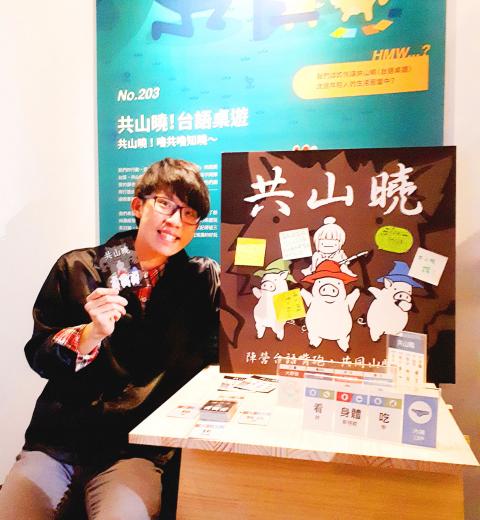A group of university students is popularizing the study of the Hoklo language (commonly known as Taiwanese) among young people through Facebook and YouTube.
The group, called Taiwanese Kids, hopes to capitalize on the kuso Internet phenomenon (derived from the Japanese word meaning “crap,” which in Taiwan refers to camp and parody) to popularize Hoklo using videos and table-top card games that incorporate humorous language, the students said.
Lu Kuan-ming (盧冠名), who is a member of Taiwanese Kids and a National Chengchi University student, said he and other members grew up Hoklo-speaking households.

Photo: CNA
They discovered after speaking with fellow university students that many Taiwanese are unable to speak Hoklo fluently, Lu said.
Young people feel there is no place to use Hoklo in their everyday lives and that they would not be able to connect with their peers if they speak it, he added.
Content for the group’s videos center on vernacular heard in places like food markets, he said.
The group also focuses on expressions common among younger people like “midterm test” and “Singles’ Day,” Lu said, adding that they hope to mix Hoklo with other popular language to develop a “youth Hoklo culture.”
Video is an effective format, because people can use their visual and aural senses, Lu said.
Aside from being entertaining, the videos present new language through storytelling, Lu said.
The group hopes its videos can be used in formal Hoklo education, as the content would appeal more to young people than traditional curricula, Lu said.
Another group of university students is promoting Hoklo through a card game titled Gong Shan Xiao (共山曉), which is homophonous with the Hoklo expression “What the hell are you saying?”
Young people do not learn Hoklo, not because of a lack of interest, but because there is no way to get started, group member Lee Tsu-yuan (李祖源) said.
“I was raised by my Hoklo-speaking grandmother in Yilan, but when I moved to Taipei for school, I no longer had the chance to speak it. When I returned to Yilan, I could not speak it fluently like I could as a child,” Lee said.
The group created a card game to encourage people to speak Hoklo, Lee added.
The game uses popular Internet spellings of Hoklo words and aims to make the language easier to remember by having players guess the answers to Hoklo-related questions, Lee said.
For example, the character for “shrimp” (蝦) is used to write the Hoklo word for “what,” which is pronounced the same way.
Lee said he was convinced of the idea after eating with a friend who previously knew no Hoklo, but was able to, over the course of the meal, tell everyone using the language that he saw a fly.
The group has also plans to develop classroom curricula that would incorporate the use of smartphones, he said.

PRAISE: Japanese visitor Takashi Kubota said the Taiwanese temple architecture images showcased in the AI Art Gallery were the most impressive displays he saw Taiwan does not have an official pavilion at the World Expo in Osaka, Japan, because of its diplomatic predicament, but the government-backed Tech World pavilion is drawing interest with its unique recreations of works by Taiwanese artists. The pavilion features an artificial intelligence (AI)-based art gallery showcasing works of famous Taiwanese artists from the Japanese colonial period using innovative technologies. Among its main simulated displays are Eastern gouache paintings by Chen Chin (陳進), Lin Yu-shan (林玉山) and Kuo Hsueh-hu (郭雪湖), who were the three young Taiwanese painters selected for the East Asian Painting exhibition in 1927. Gouache is a water-based

A magnitude 4.1 earthquake struck eastern Taiwan's Hualien County at 2:23pm today, according to the Central Weather Administration (CWA). The epicenter of the temblor was 5.4 kilometers northeast of Hualien County Hall, at a depth of 34.9 km, according to the CWA. The earthquake's intensity, which gauges the actual effect of a temblor, was the highest in Hualien County, where it measured 2 on Taiwan's 7-tier intensity scale. The quake also measured an intensity of 1 in Yilan county, Taichung, Nantou County, Changhua County and Yunlin County, the CWA said. There were no immediate reports of damage or injuries.

OFF-TARGET: More than 30,000 participants were expected to take part in the Games next month, but only 6,550 foreign and 19,400 Taiwanese athletes have registered Taipei city councilors yesterday blasted the organizers of next month’s World Masters Games over sudden timetable and venue changes, which they said have caused thousands of participants to back out of the international sporting event, among other organizational issues. They also cited visa delays and political interference by China as reasons many foreign athletes are requesting refunds for the event, to be held from May 17 to 30. Jointly organized by the Taipei and New Taipei City governments, the games have been rocked by numerous controversies since preparations began in 2020. Taipei City Councilor Lin Yen-feng (林延鳳) said yesterday that new measures by

‘WORSE THAN COMMUNISTS’: President William Lai has cracked down on his political enemies and has attempted to exterminate all opposition forces, the chairman said The legislature would motion for a presidential recall after May 20, Chinese Nationalist Party (KMT) Chairman Eric Chu (朱立倫) said yesterday at a protest themed “against green communists and dictatorship” in Taipei. Taiwan is supposed to be a peaceful homeland where people are united, but President William Lai (賴清德) has been polarizing and tearing apart society since his inauguration, Chu said. Lai must show his commitment to his job, otherwise a referendum could be initiated to recall him, he said. Democracy means the rule of the people, not the rule of the Democratic Progressive Party (DPP), but Lai has failed to fulfill his